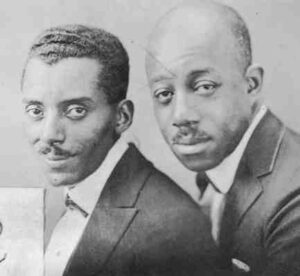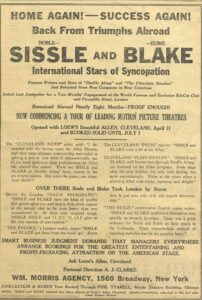YOUR DAILY DOSE OF EUBIE!!

Sissle and Blake spent the summer of 1925 touring on the Gus Sun vaudeville circuit in the Midwest, earning $1000 for 6-7 shows a week, working off their remaining debt from the debacle of Chocolate Dandies. They followed with a 6-week tour of motion picture houses, during which their agents announced “PROFITS rolled in and crowds went wild at every theatre where these artists appeared.” Despite their continuing stateside success, Sissle had long hoped to take the act abroad, where the hunger for black entertainment was great and the lack of prejudice also a major attraction. Finally, they were offered the opportunity to go to London by the William Morris Agency, who booked an extended engagement for the duo at London’s Piccadilly Club for the fall. On September 25th, Sissle, Blake, and their wives arrived in Southampton, England.
On their arrival, Sissle and Blake opened for an 8-week run in a revue titled Playtime at the Piccadilly. The white American singer Jane Green and bandleader/saxophonist Isham Jones were also on the bill. Providing additional music for dancing while the acts took a break were several British light jazz orchestras, including Jack Hylton’s orchestra, who Eubie admired, calling him the equal of Paul Whiteman. Billed as “American Ambassadors of Syncopation,” Sissle and Blake appeared wearing their stage attire of full formal dress.
Each week, a poll was taken of the Piccadilly’s audience to select the top three acts that they’d like to see appear at the club’s sister location, the Kit Kat Club. Sissle and Blake apparently won a spot there, appearing each night at both locations starting in late October. The lead singer with Isham Jones’ orchestra—who apparently was also Jones’ girlfriend at the time—lost to the American duo. Eubie recalled how upset she was that the audience chose a black act over her, saying that the bandleader had to buy her an expensive mink coat to make up for the slight. In addition to their work at the Piccadilly and Kit Kat, the duo were also appearing on the bill at the Victoria Palace.
Throughout their London performances and subsequent tour of other British towns, Sissle and Blake performed a mix of their own familiar numbers, such as “Pickaninny Shoes,” along with presumably newly composed songs, including “Why Did You Make Me Care?” However, they also included pop numbers associated with other black artists, including a show-stopping version of “Alabamy Bound.” According to one critic who saw them perform the song: “They can sing Alabamy Bound faster than any other music-hall performers imaginable. Sissle’s lips alternately disclose and uncover his white teeth at an amazing rate and Blake shivers on the piano stool like an electrified jelly while he rattles the keys faster than one would previously have thought possible.”
The reference to “white teeth” and “electrified jelly” were, of course, minstrel stereotypes. While less openly racist then their American peers, the British were unembarrassed to express their admiration for African American performers based on these ideas that, at best, gave credit to these performers for their energy and excitement and, at worst, relegated them to a lower cultural status. Even less flattering was a brief description of the act as “darkies at the piano in the manner of Layton and Johnson [sic]” on their appearance at the Alhambra music hall. Turner Layton and Clarence Johnstone were a popular African-American duo who had been performing in London since 1924. The implication was that all black performers offered similar fare.
Nonetheless, by the time of their appearance at the Alhambra in late November, the British press recognized the duo’s popularity. The critic in The Stage noted: “The new American Ambassadors of syncopation, Noble Sissle and Eubie Blake, appear to have established themselves very quickly as staunch favorites … The songs of these coloured performers have a flavor of their own, and the pianist…is one of the best of the kind we have heard for some time.”
Sissle and Blake continued to work London through Christmas, where they ended the year with a two-week appearance the London Coliseum. The Coliseum bill shows the typical eclectic offerings that were common in British music halls; besides the American duo, Diaghilev’s Ballet Russes presented a short ballet; acrobats Christo and Ronald showed off their hand and head balancing talents; and the multi-instrumentalists of Elliott’s Candies performed a “Mayday scena.” A dance band and “bioscope pictures” (silent films) rounded out the program. On other dates, they shared the bill with jugglers, marionettes, and performing animals, to mention just a few. Also that fall, Sissle and Blake recorded for the British Edison Bell label, and published songs with several local music publishers. On Christmas Eve, they appeared at a charity event for British soldiers and their families at the Fulham Theater in south London.
In January 1926, the duo took to the road for the next month and a half, appearing at the Argyle Music Hall in Birkenhead, as well as in Leeds and Birmingham, before returning to London for engagements at the Alhambra and the Cosmo Club. In early March, they performed in Birmingham, and then appeared in Belfast, Ireland, for what was apparently their last appearance in the United Kingdom. The London-based producer Charles Cochran—who had previously brought Florence Mills to London—commissioned three songs from the duo. The first, “Lady of the Moon,” was featured in the fall in his revue, Still Dancing. The other two were written for his spring 1926 Revue, “Tahiti” and “Let’s Get Married Right Away.” These songs were performed by Basil Howes and Elizabeth Hines in the show and published that April.

Ever the homebody, by March Eubie was tiring of working in England. The food was unfamiliar to him, he missed hot baths and steam heat (neither of which were available in London), he couldn’t adjust to the bustling traffic coming at him on the wrong side of the road, and the grind of running between as many as three engagements a day was wearing on him. Blake was also appalled by the poverty he observed on London’s streets and advised other black performers not to visit: “My advice to all American Negroes is to stay away from Europe. Particularly is this so if you are poor. No matter what happens or what the conditions may be in America, they can be nothing like the deplorable conditions that exist in London. I have seen thousands sleeping in the streets, bread lines with human beings standing four abreast and other distress that I hate to remember.”
On their return from the UK, their agents ran this full-page ad in Variety to celebrate their success there and to promote their upcoming US dates.